
The politics of Indonesia take place in the framework of a presidential representative democratic republic whereby the President of Indonesia is both head of state and head of government and of a multi-party system. Executive power is exercised by the government. Legislative power is vested in both the government and the bicameral People's Consultative Assembly. The judiciary is independent of the executive and the legislature.

Sukarno was an Indonesian statesman, orator, revolutionary, and nationalist who was the first president of Indonesia, serving from 1945 to 1967.

Mohammad Hatta was an Indonesian statesman, nationalist, and independence activist who served as the country's first vice president. Known as "The Proclamator", he and a number of Indonesians, including the first president of Indonesia, Sukarno, fought for the independence of Indonesia from the Netherlands. Hatta was an important figure during the Indonesian national awakening and during the national revolution, as a youth he was politically active both in the Netherlands and the Indies, which led him to be imprisoned in the Boven Digoel concentration camp for his activism, he also played a crucial part in the proclamation of Indonesian independence, being second the person to sign the declaration besides Sukarno, thus naming him as one of the founders of Indonesia.

The Communist Party of Indonesia was a communist party in Indonesia. It was the largest non-ruling communist party in the world before its violent disbandment in 1965. The party had two million members in the 1955 elections, with 16 percent of the national vote and almost 30 percent of the vote in East Java. During most of the period immediately following the Indonesian Independence until the eradication of the PKI in 1965, it was a legal party operating openly in the country.
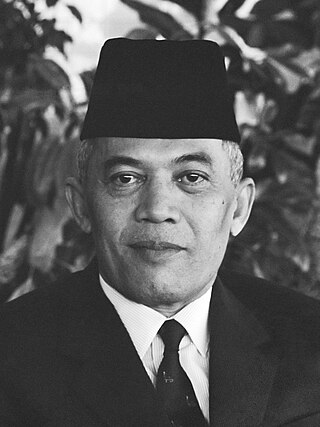
Abdul Haris Nasution was a high-ranking Indonesian general and politician. He served in the military during the Indonesian National Revolution and he remained in the military during subsequent turmoil of the Parliamentary democracy and Guided Democracy. Following the fall of President Sukarno from power, he became the Speaker of the People's Consultative Assembly under president Suharto. Born into a Batak Muslim family, in the village of Hutapungkut, Dutch East Indies, he studied teaching and enrolled at a military academy in Bandung.

Adam Malik Batubara was an Indonesian politician, diplomat, and journalist, who served as the 3rd Vice President of Indonesia from 1978 until 1983, under President Suharto. Previously, he served in a number of diplomatic and governmental positions, including Speaker of the People's Consultative Assembly from 1977 to 1978, Speaker of the People's Representative Council from 1977 to 1978, Foreign Minister of Indonesia from 1966 until 1977, and president of the United Nations General Assembly from 1971 until 1972.
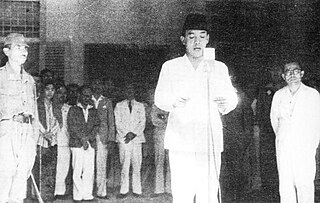
The Proclamation of Indonesian Independence was read at 10:00 on Friday, 17 August 1945 in Jakarta. The declaration marked the start of the diplomatic and armed resistance of the Indonesian National Revolution, fighting against the forces of the Netherlands and pro-Dutch civilians, until the latter officially acknowledged Indonesia's independence in 1949. The document was signed by Sukarno and Mohammad Hatta, who were appointed president and vice-president respectively the following day.

Guided Democracy was the political system in place in Indonesia from 1959 until the New Order began in 1966. It was the brainchild of President Sukarno, and was an attempt to bring about political stability. Sukarno believed that the parliamentarian system implemented during the liberal democracy period in Indonesia was ineffective due to its divisive political situation at that time. Instead, he sought a system based on the traditional village system of discussion and consensus, which occurred under the guidance of village elders. With the declaration of martial law and the introduction of this system, Indonesia returned to the presidential system and Sukarno became the head of government again.

The Order of Eleventh March, commonly referred to by its syllabic abbreviation Supersemar, was a document signed by the Indonesian President Sukarno on 11 March 1966, giving army commander Lt. Gen. Suharto authority to take whatever measures he "deemed necessary" to restore order to the chaotic situation during the Indonesian mass killings of 1965–66. The abbreviation "Supersemar" is also a play on the name of Semar, the mystic and powerful figure who commonly appears in Javanese mythology including wayang puppet shows. The invocation of Semar was presumably intended to help draw on Javanese mythology to lend support to Suharto's legitimacy during the period of the transition of authority from Sukarno to Suharto.
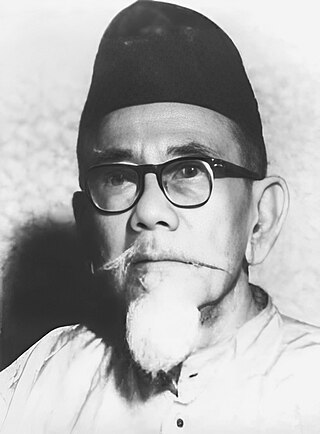
HajiAgus Salim was an Indonesian journalist, diplomat, and statesman. He served as Indonesia's Minister of Foreign Affairs between 1947 and 1949.
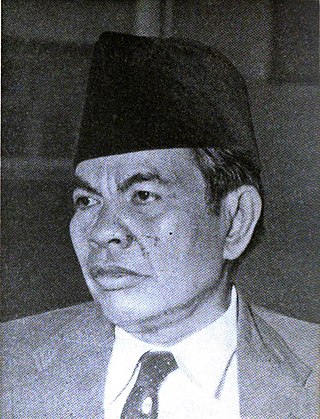
Mohammad Yamin was an Indonesian poet, politician and national hero who played a key role in the writing of the draft preamble to the 1945 constitution.
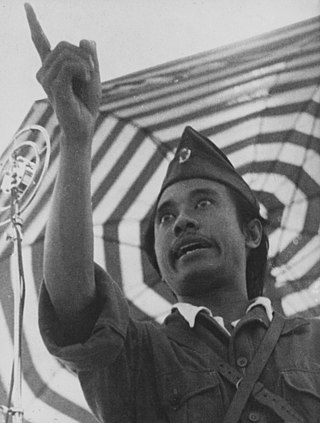
Sutomo, also known as Bung Tomo, is best known for his role as an Indonesian military leader during the Indonesian National Revolution against the United Kingdom and the Netherlands. He played a central role in Battle of Surabaya when the British attacked the city in October and November 1945.

Oemar Said Tjokroaminoto, better known in Indonesia as H.O.S. Tjokroaminoto, was an Indonesian nationalist. He became one of the leaders of the Islamic Trade Union, founded by Samanhudi, which became Sarekat Islam, which they both cofounded.

The president of the Republic of Indonesia is the head of state and head of government of the Republic of Indonesia. The president leads the executive branch of the Indonesian government and is the commander-in-chief of the Indonesian National Armed Forces. Since 2004, the president and vice president are directly elected to a five-year term, once renewable, allowing for a maximum of 10 years in office.
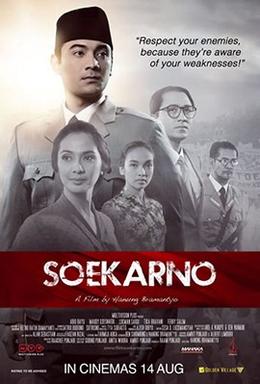
Soekarno is a 2013 Indonesian biographical film directed by Hanung Bramantyo and written by Ben Sihombing. This film tells the story of the life of the late Sukarno, the first president of Indonesia. Sukarno, who was born with the name "Kusno", was one of the major figures who played an important part in the fight for Indonesia's independence from Dutch colonial rule. This film stars Ario Bayu as Sukarno.
Marhaenism is a socialistic political ideology originated and developed by the first President of Indonesia, Sukarno. It was developed from the ideas of Marxism applied according to the nature and culture of Indonesia, or simply described as "Marxism adapted to Indonesian conditions".

Wikana was an Indonesian minister and independence leader. He was one of the youths who forced Sukarno and Hatta to declare independence immediately after the surrender of the Japanese. He was the first Indonesian Minister of Youth and Sport. He was a member of the Indonesian Communist Party. Sometime after the 1965 coup d'état attempt, he was arrested and went missing, it is supposed that he was one of the assassinated in the Indonesian mass killings of 1965–66.

Sukarni Kartodiwirjo was an Indonesian freedom fighter and activist who demanded independence for Indonesia during the Dutch colonial era and the Japanese occupation, and was the chairman of the Murba Party until his death.
Censorship in Indonesia has varied since the country declared its independence in 1945. For most of its history the government of Indonesia has not fully allowed free speech and has censored controversial, critical, or minority viewpoints, and during periods of crackdown it imprisoned writers and political activists. However, partly due to the weakness of the state and cultural factors, it has never been a country with full censorship where no critical voices were able to be printed or voiced.

Pancasila is the official, foundational philosophical theory of Indonesia. The name is made from two words originally derived from Sanskrit: "pañca" ("five") and "śīla".



















